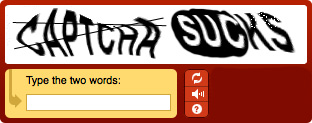Tired of choosing between the lessor of two evils? Here is something Republicans and Democrats can agree on
 CAPTCHA stands for Completely Automated Public Turing test to tell Computers and Humans Apart and was originally foisted upon the citizens of the internet by Carnegie Mellon in response to a call by Yahoo to develop a system to keep computer generated Spam out of email and comments. While effective, the solution was a failure from the beginning because it placed the burden of proof on the user, a burden that has become increasingly difficult every day.
CAPTCHA stands for Completely Automated Public Turing test to tell Computers and Humans Apart and was originally foisted upon the citizens of the internet by Carnegie Mellon in response to a call by Yahoo to develop a system to keep computer generated Spam out of email and comments. While effective, the solution was a failure from the beginning because it placed the burden of proof on the user, a burden that has become increasingly difficult every day.
- CAPTCHA suck time and money; each day human are forced to solve 200 million Re-Captcha’s plus countless other puzzle. Do the math and CAPTCHAs waste about $12 Billion of human productivity every year.
- It really sucks that the hackers have gotten so good at solving them that CAPTCHA is now more of an obstacle for legitimate users than for dedicated hackers.
- It really, really sucks that you can outsource Mechanical Turks solutions via a CAPTCHA farm in China or the Philippines for about $.02 each.
- CAPTCHA really, really, really sucks because it is an obstacle for conversion, with some estimates showing that as many as 25% of people fail the first attempt at solving it and between 3% and 10% of your potential customers simply give up.
The only thing that sucks worse than CAPTCHA and ReCaptcha is not having one to protect your site from the inevitable onslaught of Spam and bot users being held at bay by this brittle defense.
There is hope, however, as Pramana introduced two new products today that are designed to help webmasters in their battle against blight. The first is call bot alert, which allows webmasters to quantify bot activity much the same way analytics lets you quantify human activity. The second is Bot Block, a true CAPTCHA alternative that is invisible and doesn’t require your users to do anything.
BotBlock™ is the first and only real-time weapon that keeps the bots out, but lets all of your real customers in. It integrates directly into your web pages. It invisibly analyzes and interrogates each interaction, and makes a reliable, real-time determination between human and bot.
Once detected, you can deal with an automated process as you please. You can block them outright. Give them a 404 that the page doesn’t exist. You can shut them down. We provide you the control to deal with them the most effective way for your web property.
The battle is far from over, but perhaps today will mark the turning point in the war between humans and bots.
As you pointed out, most of the CAPTCHA tests seen on websites today have become a real pain for legitimate website visitors – but they don’t have to be that way. Overall, CAPTCHA verification tests are a good tool for stopping bots and curbing the spam, fraudulent registrations and malicious links that bots spread. We just need a new way of thinking about CAPTCHA – they don’t need to be an ugly, eye-straining mess of letters. The point of a CAPTCHA is to tell the difference between a human and a bot. One way to do that is to leverage a talent that comes easily to people but is difficult for computer programs to replicate.
One such alternative is to use pictures as a CAPTCHA test. In general, the human brain has an easy time recognizing and interpreting images, even if the image only shows a portion of an object or shows that object in an environment that you’ve never seen before. A company that I recently started working for – Confident Technologies – has leveraged that knowledge to create a new type of CAPTCHA that is significantly easier on people but still stops bots. It simply presents the website visitor with a grid of randomly generated pictures and asks the visitor to identify and click on specific pictures (e.g. “Click on the cat, the car and the boat.”). It’s an easy task for people, but computer vision is not advanced enough to be able to intelligently identify the subject matter of the random images and click on the correct ones. You can see how it works here: http://demo.confidenttechnologies.com/captcha/.
Bots can cause serious problems and solutions are needed to stop them. CAPTCHA can be a viable solution, especially when used in combination with other security measures. Websites simply need a different approach to CAPTCHA and use tests that can tell computers and humans apart in a way that is easy on people, not an eye strain.
~ Sarah, Confident Technologies
While alternatives such as kitten captcha can work, they still put the burden for site security on the user. Pramana’s approach returns security concerns to the site owner.
If you use Captcha then I will not be using your site anymore fed up witt wasting my time doing those stupid things 2 or 3 times.
So I can’t spell, great advertisement for captcha